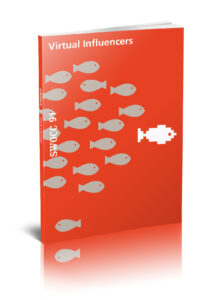
Priska Breves en Zeph van Berlo zijn communicatiewetenschappers aan de Universiteit van Amsterdam, bij de Amsterdam School of Communication Research (ASCoR). Samen hebben ze een SWOCC boek geschreven over het effectieve en ethische gebruik van virtual influencers, zoals Lil Miquela en de Nederlandse Esther Olofsson.
Daarnaast zijn Priska en Zeph keynote sprekers tijdens de aankomende SWOCC-bijeenkomst: ‘Virtuele Influencers‘ op 21 november, waar ze de belangrijkste bevindingen uit hun boek in het Engels zullen presenteren. Gebaseerd op hun eigen onderzoeken en bestaande literatuur zullen ze je inzicht en praktisch advies geven in wat virtuele influencers zijn, hoe mensen ze beoordelen en herkennen, en hoe waardevol ze kunnen zijn voor de praktijk. Verder gaan ze specifiek in op of en hoe mensen (parasociale) relaties opbouwen met deze digitale persoonlijkheden.
We hebben Priska en Zeph een paar vragen gesteld om alvast een voorproefje van hun presentatie te krijgen. Maak alvast kennis met de auteurs van SWOCC publicatie 91: Priska en Zeph!
 Priska Breves, PhD, is Assistant Professor Persuasieve Communicatie aan de Amsterdam School of Communication Research, Universiteit van Amsterdam. Haar onderzoek richt zich op de impact van opkomende media en fenomenen, waaronder social media influencers, op de percepties, attitudes en gedragingen van gebruikers.
Priska Breves, PhD, is Assistant Professor Persuasieve Communicatie aan de Amsterdam School of Communication Research, Universiteit van Amsterdam. Haar onderzoek richt zich op de impact van opkomende media en fenomenen, waaronder social media influencers, op de percepties, attitudes en gedragingen van gebruikers.

Zeph van Berlo, PhD, is Assistant Professor Persuasieve Communicatie aan de Amsterdam School of Communication Research. Hij onderzoekt invloed in immersieve omgevingen (bijv. AR/VR) en de impact van nieuwe technologieën (zoals generatieve AI) op consumentengedrag.
What attracts you the most to the world of Virtual Influencers?
We find it fascinating how people form relationships with virtual influencers, even when they know these characters are not human but rather creations of artificial intelligence and advanced technology. This phenomenon highlights the human tendency to connect emotionally, regardless of the entity’s physical existence. Additionally, the versatility of virtual influencers is remarkable; they can be customized to fit various brand identities and messaging strategies. The potential for scalability and interactivity is virtually limitless, allowing brands to engage with their audiences in innovative and personalized ways.
How do you think Virtual Influencers will change the future of influencer marketing?
The rise of virtual influencers is likely to significantly increase the volume of influencer marketing, primarily because they can be produced at a lower cost compared to human influencers. As virtual agents become more commonplace, the landscape for human influencers may shift, with real influencers potentially creating digital doubles of themselves. This blurring of boundaries could redefine what it means to be an influencer. Moreover, virtual influencers make this marketing approach more accessible for smaller brands, allowing for tailored campaigns that reach specific audiences. This shift could also lead to an increase in brand ambassadors, creating a more diversified influencer ecosystem.
What are the main reasons for brands or marketing professionals to choose a virtual influencer?
As detailed in our SWOCC publication, several key advantages make virtual influencers appealing. They are cost-effective, versatile, and controllable. For example, a virtual influencer can quickly learn and perform the latest viral TikTok dance without the need for hours of practice, making them incredibly efficient for brands looking to capitalize on current trends. This adaptability allows marketers to respond rapidly to changes in consumer behavior and preferences, enhancing their overall marketing strategies.
When would you choose a human influencer instead?
Currently, human influencers are often perceived as more trustworthy, which can be crucial for brands or causes that prioritize authenticity. If trust is a key factor in your marketing strategy, opting for a human influencer may still be the best choice at this time. However, it’s important to note that societal perceptions of AI and virtual influencers are constantly evolving. As trust in these digital entities develops, we may see a shift in preferences toward virtual influencers in the future.
Can you give us a sneak peek into your presentation on Nov. 21? What key takeaway do you want to share with attendees?
In our presentation, we will discuss how virtual influencers can effectively complement a marketing mix in certain scenarios. However, it’s crucial to ensure that all conditions for building a parasocial relationship are met. This includes engaging in meaningful interactions and sharing personal insights with the audience. Brands should focus on establishing genuine relationships with their virtual influencers rather than just having them post sporadically. Creating a sense of connection will enhance the effectiveness of virtual influencers and improve audience engagement.
Wil je de presentatie van Priska Breves en Zeph van Berlo niet missen? En wil je meer weten over hoe je virtuele influencers het beste kunt vormgeven en inzetten om effectief te zijn in je digitale marketingstrategie? Meld je dan snel aan voor de SWOCC-bijeenkomst: Virtuele Influencers!
